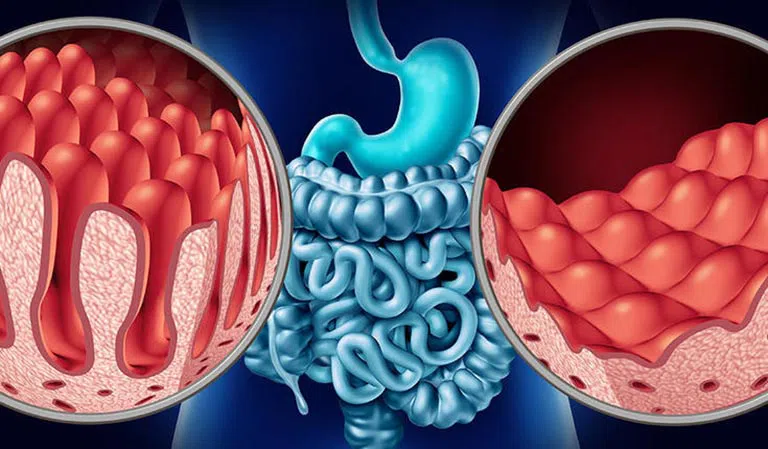If you’re struggling with chronic digestive issues like bloating, gas, abdominal pain, diarrhea, or constipation, you might wonder: Is it IBS or Celiac disease? These two conditions can feel very similar, but understanding the differences is essential for getting the right diagnosis and treatment.
Let’s explore how Irritable Bowel Syndrome (IBS) and Celiac Disease differ — and how to know which one you might have.
What Is IBS?
IBS (Irritable Bowel Syndrome) is a functional gastrointestinal disorder, which means it affects how your gut works — not its structure. IBS is one of the most commonly diagnosed GI conditions in the United States, affecting up to 15% of adults.
Common IBS symptoms include:
- Abdominal pain or cramping
- Bloating and gas
- Constipation (IBS-C), diarrhea (IBS-D), or both (IBS-M)
- Mucus in stool
- A feeling of incomplete evacuation
IBS is not caused by inflammation or damage to the intestines. It is usually triggered by food sensitivities, stress, or gut microbiome imbalances. It can be chronic but is not considered life-threatening.
What Is Celiac Disease?
Celiac disease is a serious autoimmune condition. When people with Celiac eat gluten (a protein found in wheat, barley, and rye), their immune system attacks the lining of the small intestine. This leads to damage and inflammation, which can impair nutrient absorption and lead to a wide range of symptoms — not just in the gut.
Celiac disease symptoms may include:
- Chronic diarrhea or constipation
- Fatigue
- Weight loss
- Nutrient deficiencies (iron, B12, vitamin D)
- Anemia
- Skin rashes (dermatitis herpetiformis)
- Bone or joint pain
- Brain fog or depression
Celiac disease affects about 1 in 100 Americans, but many cases go undiagnosed or are misdiagnosed as IBS.
IBS vs Celiac: Key Differences
| Feature | IBS | Celiac Disease |
|---|---|---|
| Cause | Functional disorder | Autoimmune reaction to gluten |
| Trigger | Food sensitivities, stress, microbiome issues | Gluten (wheat, barley, rye) |
| Damage to intestines | No | Yes – damage to villi in small intestine |
| Symptoms outside gut | Rare | Common (fatigue, rash, anemia) |
| Diagnostic test available? | No single test | Yes – blood tests and biopsy |
| Long-term risks | Minimal | Increased risk of osteoporosis, infertility, and some cancers |
| Treatment | Diet/lifestyle changes, gut support | Lifelong strict gluten-free diet |
Can IBS Be Mistaken for Celiac?
Yes — IBS is often misdiagnosed in people who actually have Celiac disease, especially if testing is not done early on.
Because the symptoms of IBS and Celiac overlap, such as bloating, gas, and diarrhea, many patients are told they have IBS without ever being tested for Celiac.
That’s why testing is so important. A simple blood test to check for anti-tTG or anti-EMA antibodies can screen for Celiac disease. If the test is positive, your doctor may perform an upper endoscopy with a biopsy to confirm the diagnosis.
⚠️ Important: Do NOT go gluten-free before testing, or your results may be inaccurate.
What If You Test Negative for Celiac But Still React to Gluten?
You might have non-Celiac gluten sensitivity (NCGS). This is when you experience IBS-like symptoms (gas, bloating, diarrhea, fatigue) after eating gluten — but without intestinal damage or autoimmunity.
This condition is still being researched, but eliminating gluten in these cases may bring significant symptom relief.
How to Get the Right Diagnosis
If you’re unsure whether you have IBS or Celiac disease, here’s what to do:
✅ Talk to a GI specialist or IBS expert
✅ Request Celiac screening blood tests
✅ Track your symptoms and diet
✅ Consider stool and microbiome testing for IBS
✅ Work with a dietitian to identify triggers
IBS and Celiac Can Coexist
It’s also possible to have both IBS and Celiac disease. Even after going gluten-free, some Celiac patients continue to experience IBS-like symptoms due to gut inflammation, microbiome imbalances, or food sensitivities.
That’s where advanced gut testing and probiotic therapy can help.
GutShield: A Smarter Approach to Digestive Health

If you’re managing IBS, Celiac, or gluten sensitivity, your gut microbiome plays a major role in how you feel. Support it with GutShield – Liquid Spore Probiotic, a next-generation probiotic designed to:
- Survive stomach acid
- Balance gut bacteria
- Reduce bloating and inflammation
- Support long-term digestive wellness
Unlike traditional probiotics, GutShield’s spore-forming strains thrive in the harsh gut environment — making it ideal for people with chronic digestive disorders.
Final Takeaway
Don’t assume you have IBS without ruling out Celiac disease or gluten sensitivity. Accurate testing is key to proper treatment — and lasting relief.
And whether you’re dealing with IBS, Celiac, or both, your gut deserves targeted support. Try GutShield to strengthen your microbiome and take the next step toward a healthier, symptom-free life.








